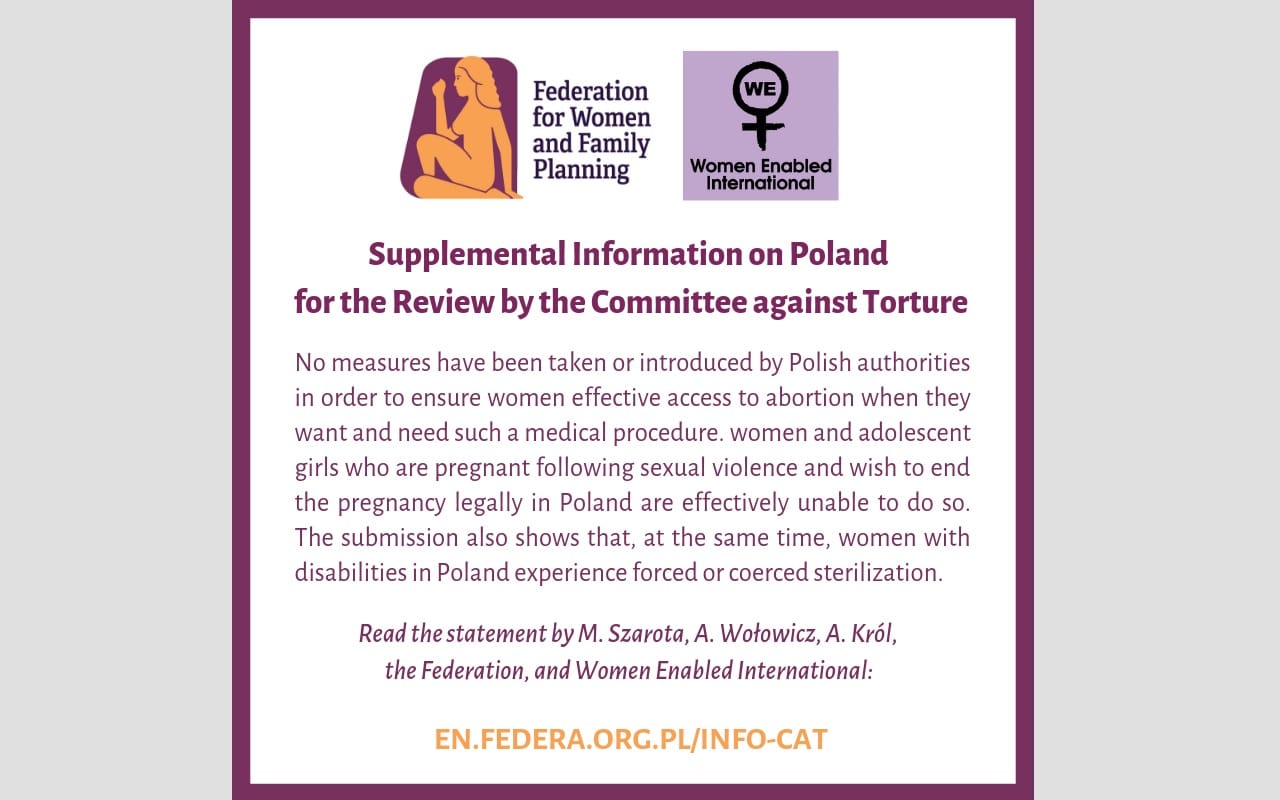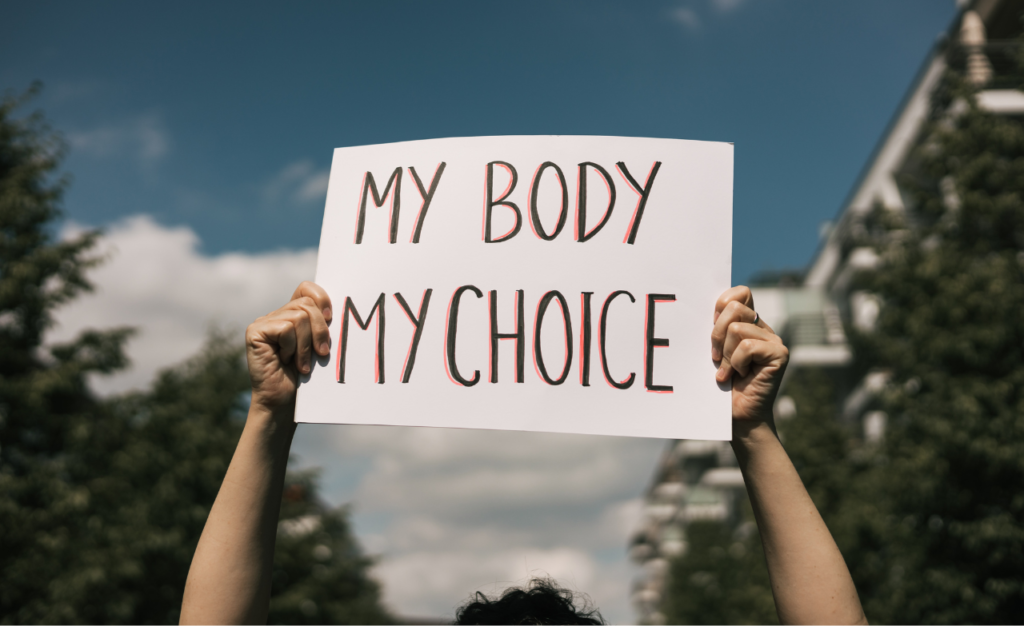Federacja na rzecz Kobiet i Planowania Rodziny, Women Enabled International, Magdalena Szarota (Lancaster University, Stowarzyszenie Kobiet Niepełnosprawnych „One.pl”) oraz niezależne badaczki Agnieszka Król i Agnieszka Wołowicz przedkładają niniejsze sprawozdanie Komitetowi Przeciwko Torturom w związku z oceną przestrzegania przez Polską Konwencji w sprawie zakazu stosowania tortur oraz innego okrutnego, nieludzkiego lub poniżającego traktowania albo karania.
Supplemental Information on Poland for the Review by the Committee against Torture in a PDF file
The Federation for Women and Family Planning is a non-governmental organization based in Poland that works locally, regionally and internationally on advancement of women’s reproductive rights through monitoring, advocacy and educational activities as well as strategic litigation before domestic and international courts.
Women Enabled International (WEI) works at the intersection of women’s rights and disability rights to advocate and educate for the human rights of all women and girls, emphasizing women and girls with disabilities, and works to include women and girls with disabilities in international resolutions, policies, and programs addressing women’s human rights and development, in collaboration with disabled women’s rights and women’s rights organizations worldwide.
The Committee in its last concluding observations expressed concerns about restrictions in Poland on access to abortion, especially for victims of rape, due to the refusal of some physicians and clinics to perform legal operations on the basis of conscientious objection. The Committee noticed that these restrictions lead women to resort to clandestine, often unsafe abortions with all the health risks they entail. The Committee recommended that the State party should ensure that women, especially victims of rape, who voluntarily decide to terminate their pregnancy have access to safe, legal abortions. In accordance with the 2012 World Health Organization technical and policy guidance on safe abortion, the State party should ensure that the exercise of conscientious objection does not prevent individuals from accessing services to which they are legally entitled. The State party should also implement a legal and/or policy framework that enables women to access abortion where the medical procedure is permitted under the law (para. 23)[1].
In the list of issues, the Committee asked Poland to provide information about measures taken to ensure that women, especially victims of rape, who voluntarily decide to terminate their pregnancy have access to safe, legal abortions (para. 28)[2].
This Supplemental Information is aimed at proving that no above mentioned measures have been taken or introduced by Polish authorities in order to ensure women effective access to abortion when they want and need such a medical procedure. The submission also shows that, at the same time, women with disabilities in Poland experience forced or coerced sterilization.
Lack of Access to Safe and Legal Abortion in Poland
Poland’s Restrictions on Access to Abortion
Poland has one of the most restrictive abortion laws in Europe. Access to abortion is regulated by the 1993 Family Planning Act and is permitted in three circumstances only: 1) when the pregnancy endangers the life or health of the woman; 2) when there is a high probability of a severe and irreversible fetal impairment, abortion is permitted until the fetus reaches viability; and 3) when the pregnancy results from a crime, abortion is permitted during the first 12 weeks of pregnancy[3]. Abortion is criminalized in all situations beyond these three circumstances and doctors or anyone else who helps a woman to obtain an abortion outside of the scope of the law is liable to a three-year prison sentence[4].
Access to abortion services is effectively curtailed by Poland’s maintenance of criminal sanctions for abortions performed outside of the very limited circumstances allowed for by the law and by the highly restrictive nature of the law itself. These combine to generate a punitive and stigmatizing environment that undermines effective implementation of Poland’s abortion law and creates a chilling effect for medical professionals. The stark effects of the restrictive legal framework are compounded by a lack of effective regulation of conscience-based refusals of care by doctors and an absence of any semblance of guidelines and procedures that would facilitate women’s access to legal abortion services. The severe difficulties which women in Poland face in gaining access to legal abortion services are a result of the chilling effect of the restrictive abortion law.
The official data shows that each year the number of legal abortions performed in Poland is, compared to the number of women of reproductive age in Poland, constantly at a low rate, ranging from 971 in 2014, 1040 in 2015, 1110 in 2016 to 1061 in 2017[5]. Moreover, the number of legal abortions in cases where the pregnancy is a result of sexual assault has remained mostly unchanged, ranging from 0 to 3 legal abortions per year.
In this regard it is worth mentioning the number of initiated proceedings in cases of sexual assaults, which in 2017 stood at:
- 2486 (rape);
- 2391 (sexual abuse of a minor);
- 274 (sexual abuse of a vulnerable or mentally incompetent person);
- 119 (sexual abuse in case of dependency)[6].
That totally gives at least a number of 5270 cases, taking into account the problem of sexual assaults under-reporting[7].
The statistics demonstrate that women and adolescent girls who are pregnant following sexual violence and wish to end the pregnancy legally in Poland are effectively unable to do so.
Procrastination, Obfuscation and Arbitrariness in Medical Professionals’ Practice
The implementation of Poland’s abortion law is marred by procrastination, obfuscation and arbitrariness by both medical professionals (when the pregnancy endangers the life or health of the woman and when there is a high probability of a severe and irreversible fetal impairment) and prosecutors (in case when pregnancy is a result of a criminal act) who play key roles in certifying and authorizing women’s access to legal abortion services under the current legal framework. For example, there are no standardized guidelines for medical professionals on the provision of legal abortion services in accordance with the current law.
The research into hospital procedures and guidelines for the provision of legal abortion services found that these varied hugely and were often incomplete or arbitrary[8]. Many hospitals imposed restrictions beyond those specified in the law and required additional medical opinions of a specialist, joint consultation, or ward administrator to confirm that the requirements for a legal abortion were met. Moreover, the current law requires that a prosecutor certify the sexual assault of a woman who has become pregnant as a result of the assault and wishes to end the pregnancy. There are regular reports of prosecutors refusing to issue certification of the assault, thus effectively preventing women’s access to legal abortion services. Such requirements are not imposed by the law but prolong the procedure and places obstacles in the way of women’s access to legal abortion.
Conscience-based Refusals as a Barrier in Access to Abortion
Conscience-based refusals made by individual doctors remain a widespread practice. They are stipulated in Article 39 of the Medical Profession Act. The referral obligation previously imposed on doctors was invalidated by Poland’s Constitutional Tribunal in 2015. As a result, now when doctors refuse to provide legal abortion care to women on grounds of conscience or religion they have no duty to refer their patient to another competent provider or even to inform her of where or from whom she can obtain legal abortion care. Its invalidation has particular severe implications for those women and adolescent girls in Poland who seek access to abortion care following sexual assault, for whom abortion is only legal in the first 12 weeks of pregnancy. Health facilities and providers are not obliged to provide the information on where abortion care is available, either. Moreover, institutional refusals of legal abortion happen and despite its unlawfulness, they are not sanctioned. Taking into account that doctors and hospitals refuse to perform services, there are no institutions that would be responsible for pointing out the health provider and women in fact do not know where to find needed information, we can describe this situation as a systemic failure to enforce the binding abortion law in which victims of sexual assaults are affected in the negative way the most.
Lack of Effective Appeal Procedure for Women Seeking Abortions
The current complaints procedure that allows patients to challenge a doctor’s decision or opinion under the Patient Rights Act serves as an inadequate procedural mechanism which women and girls in Poland can use to enforce their entitlements to legal abortion care. It is difficult for patients to apply the complaints procedure in cases of legal abortion refusal on grounds of conscience or religion, while those factors cannot be controlled via this procedure. Secondly, the procedure is not tailored to the specific needs of women seeking legal abortion services, because it currently provides the Medical Board with 30 days to issue a decision on complaints. This lengthy timeline is inapplicable in situations where women are seeking access to legal abortion services in the first 12 weeks of pregnancy. What is more, no procedures for ensuring execution and enforcement of the Medical Board’s decisions have been put in place. The Patient Rights Act also excludes the possibility of judicial review of the Medical Board’s decisions.
As a result, women in Poland who seek abortion care are forced to travel across the country to find a hospital willing to perform this medical procedure or they decide to go abroad. It demands covering extra costs by them, not only financial but also emotional.
In its decisions Mellet v. Ireland (2016)[9] and Whelan v. Ireland (2017)[10] the Human Rights Committee found that forcing women to choose between continuing a pregnancy and travelling to another country to access legal abortion services can cause anguish and suffering. It may be also seen as a inhuman or degrading treatment.
Recommendations
- Reform the law so as to decriminalize abortion and legalize abortion on request, at least up until 12 weeks of pregnancy, and adopt the necessary accompanying guidelines to ensure women can access safe abortion services in a timely manner and without unnecessary authorization or certification requirements.
- Taking account of international and comparative good practices, establish in law a new complaint procedure that sets out an effective and timely procedure tailored to the specific circumstances of pregnant women.
- Adopt a series of effective measures to guarantee that abortion services are available and accessible to women throughout Poland and that medical professionals’ conscience-based refusals of care do not jeopardize women’s access to reproductive health care. To this end the government should:
- amend its laws to explicitly prohibit medical institutions from refusing to provide legal reproductive health services;
- adopt new legislation to enshrine into Polish law a referral obligation on hospitals in which doctors refuse care on grounds of conscience;
- require hospitals to organize the provision of services in a manner that ensures women can access abortion services without undue delay;
- require hospitals to notify the Ministry of Health, on a quarterly basis, as to the number of practitioners in the hospital who are refusing care on grounds of conscience and regularly monitor the practice of conscience-based refusals of care.
Forced or Coerced Sterilization of Women with Disabilities in Poland
Forced Sterilization of Women with Disabilities in Poland
Recent qualitative research reveals that forced or coerced sterilization of women with disabilities happens in Poland and is primarily performed on women with intellectual disabilities. However, it must be highlighted that it is a taboo topic in Poland. Poland maintains a system of guardianship that allows some persons with disabilities to be stripped of legal capacity and allows guardians to make important life decisions, including decisions related to sterilization, on their behalves[1]. Although this places women under guardianship at higher risk of being sterilized without their consent, the cases of forced sterilizations identified by researchers include both women under guardianship and those not incapacitated under the guardianship system.
A qualitative study[2] conducted between 2016 and 2019 revealed five cases and showed that forced sterilization occurs in two main contexts. Firstly, in the institutionalized context: Poland has not undergone deinstitutionalization and a high number of persons with disabilities (more than 80,000 persons) live in institutions[3]. Secondly, forced sterilization occurs in the family context, especially when parents request the sterilization of their daughters with intellectual disabilities. In the cases identified in the research, women with disabilities did not know that they were sterilized. Thus, they did not give informed consent to sterilization. Instead, it was the parents who made the decision about sterilization and who disclosed the fact to the researchers. The parents’ primary motivation for sterilization is that they cannot bear the potential consequences of their disabled daughter’s sexual life—namely, taking care of possible future children. However, in one case, a mother explained that she took the decision in order to protect her daughter from sexual violence and unwanted pregnancy.
It should be highlighted that sterilization is restricted by law in Poland and may only be performed to preserve a woman’s life or health, so most cases happen illegally, underground. As a result, data on sterilization is difficult to obtain and research findings likely underestimate the prevalence of the forced or coerced sterilization of women with disabilities. In addition, it is an expensive procedure in Poland, which might also serve as a financial barrier that protects some women from undergoing the procedure. Thus, as a general matter, sterilization is less common in Poland than the practice of forced contraceptive use or imposing other types of contraceptive methods on women with disabilities without their informed consent.
In its 2018 concluding observations to Poland, the Committee on the Rights of Persons with Disabilities (CRPD Committee) expressed concern about “reported forced sterilization of women and girls with disabilities, deprived of their legal capacity, placed under guardianship and living in institutions,” recommending that Poland “ensur[es] that women and girls with disabilities have access to support to make important life decisions for themselves and are not subjected to sterilization without their full, free and informed consent”[4]. The CRPD Committee also specifically called on Poland “to repeal all discriminatory provisions under the Civil Code and other legal acts, allowing for deprivation of legal capacity of persons with disabilities,” “to establish a procedure aimed at restoring full legal capacity of all persons with disabilities, and to develop supported decision-making mechanisms that respect the autonomy, will and preferences of the person”[5].
Medical and International Human Rights Standards on Sterilization
Informed consent is an internationally-recognized health care standard, and the World Health Organization (WHO), the Council of Europe, and the International Federation of Gynecology and Obstetrics (FIGO) strongly and unanimously require informed consent as an essential component of any sexual and reproductive health-related medical intervention[6]. In 2011, FIGO adopted guidelines specifically regarding female contraceptive sterilization, stating that only women themselves can give ethically valid consent to their own sterilization[7]. As such, FIGO found that a forced procedure occurs when a person is subjected without her knowledge or consent to the procedure, or is not given a chance to consent[8]. According to U.N. agency guidelines addressing this issue, if informed consent cannot be immediately obtained for non-life-saving measures, those measures should not be performed[9]. In particular, according to the U.N. Interagency statement aimed at eliminating forced and involuntary sterilization, “the individual concerned must be given the time and information needed to make an informed choice about sterilization” [10]. The CRPD Committee has further found that depriving women with disabilities of legal capacity through substituted decision-making regimes like guardianship can facilitate forced sterilization[11] and has called on States to abolish guardianship and replace this with systems to instead support individuals in making important life decisions[12].
The CAT Committee has also consistently condemned forced and coerced sterilizations performed without free and informed consent[13] and has noted its particular impact on marginalized groups, particularly women with mental disabilities, calling on at least one State to repeal an administrative decree that still allowed the forced sterilization of persons with mental disabilities[14]. The Committee has recommended that all allegations of forced or coerced sterilization and abortion be impartially investigated[15], with perpetrators being held accountable[16]—including through criminal prosecution and punishment[17]. The Committee has recommended that States ensure victims receive fair and adequate redress,[18] including compensation;[19] that medical personnel and public officials be trained on how to obtain free and informed consent for sterilization as well as about their potential criminal liability for involuntary sterilization,[20] and that written materials about sterilization that are translated into relevant languages to ensure that they are accessible.[21]
Recommendations
- Adopt laws and policies that specifically prohibit and criminalize sterilization of women and girls with disabilities without the informed consent of the woman or girl involved. Provide additional oversight of medical procedures performed in long-term residential care institutions to ensure that these laws and policies are enforced.
- Collect and make public data on the performance of involuntary sterilizations that is disaggregated by gender and disability.
- Impartially investigate all allegations of forced or coerced sterilization and provide adequate redress to victims, including compensation.
- Train medical personnel and public officials on standards of informed consent for sterilization, including those outlined by FIGO, and ensure that all information and written materials provided to women and girls with disabilities on sterilization are in accessible formats and provided so as to facilitate their informed consent.
- Abolish guardianship for persons with disabilities in Poland and replace this with a system to provide support, when needed and requested, for individuals to make important decisions, including those related to sexual and reproductive health.
[1] CAT Committee, Concluding Observations: Poland, CAT/C/POL/CO/5-6 (2013).
[2] CAT, List of issues prior to submission of the seventh periodic report of Poland, CAT/C/POL/QPR/7.
[3] Law of Jan. 7, 1993 on Family Planning, Human Embryo Protection, and Conditions of Legal Pregnancy Termination amended as of Dec. 23, 1997, art. 4a.1 (1-3) (Pol.).
[4] Criminal code, arts. 152-154 (Pol.).
[5] Sprawozdanie Rady Ministrów z wykonywania oraz o skutkach stosowania w 2017 r. ustawy z dnia 7 stycznia 1993 r. o planowaniu rodziny, ochronie płodu ludzkiego i warunkach dopuszczalności przerywania ciąży, available at https://bip.kprm.gov.pl/kpr/bip-rady-ministrow/informacje-i-sprawozdan/2019/6453,2019.html.
[6] The numbers come from the official police reports: https://bit.ly/2IaAkQs.
[7] The report that mentions the problem of sexual assaults under-reporting: https://bit.ly/2S3lhIa.
[8] Raport z Monitoringu, Federacja na rzcez Kobiet i Planowania Rodziny [Report of monitoring about procedures of access to legal abortion in Polish hospitals, FWFP for Women and Family Planning](Warsaw 2016); available at
http://www.federa.org.pl/dokumenty_pdf/raporty/kontrola_praw_kobiet.pdf.
[9] Human Rights Committee, Views adopted by the Committee under article 5(4) of the Optional Protocol, concerning communication No. 2324/2013, CCPR/C/116/D/2324/2013
[10] Human Rights Committee, Views adopted by the Committee under article 5(4) of the Optional Protocol, concerning communication No. 2425/2014, CCPR/C/119/D/2425/2014.
[1] See, e.g., CRPD Committee, Initial Report of State Party: Poland, ¶ 128, U.N. Doc. CRPD/C/POL/1 (2015), http://tbinternet.ohchr.org/_layouts/treatybodyexternal/Download.aspx?symbolno=CRPD%2fC%2fPOL%2f1&Lang=en.
[2] Wołowicz, A. (forthcoming, in press) Macierzyństwo kobiet z niepełnosprawnością intelektualną.
[3] Król A. (2019), Living independently and being included into community. Report on Poland. The Academic Network of European Disability Experts (ANED) https://www.disability-europe.net/country/poland.
[4] CRPD Committee, Concluding Observations: Poland, ¶¶ 30-31, U.N. Doc. CRPD/C/POL/CO/1 (2018).
[5] CRPD Committee, Concluding Observations: Poland, ¶ 20, U.N. Doc. CRPD/C/POL/CO/1 (2018).
[6] Informed consent has three essential components: physician disclosure of the risks and benefits of, and alternatives to, the medical procedure; the patient’s understanding of that disclosure; and voluntary patient choice. World Health Organization (WHO), A Declaration on the Promotion of Patients’ Rights in Europe, ICP/HLE 121, Art. 3.1 (1994); U.N. Office of the High Commissioner for Human Rights, Istanbul Protocol, Manual on the Effective Investigation and Documentation of Torture and Other Cruel, Inhuman or Degrading Treatment or Punishment, ¶ 63, U.N. Doc. HR/P/PT/8/Rev.1 (2004) (“an absolutely fundamental precept of modern medical ethics is that patients themselves are the best judge of their own interests.”); Convention for the Protection of Human Rights and Dignity of the Human Being with Regard to the Application of Biology and Medicine: Convention on Human Rights and Biomedicine, art. 5, adopted Apr. 4, 1997, Eur. T.S. No. 164 (entered into force Dec. 1, 2009); International Federation of Gynecology and Obstetrics (FIGO), Guidelines regarding informed consent, in Ethical Issues in Obstet & Gynec. 13-14 (Oct. 2009).
[7] FIGO, Female Contraceptive Sterilization, 115 Int’l J. of Gynecology And Obstetrics 88, 88-89, ¶ 8 (2011), http://www.cehat.org/uploads/files/Female%20Contraceptive%20Sterilization%20Statement%281%29.pdf.
[8] FIGO, Female Contraceptive Sterilization, 115 Int’l J. of Gynecology And Obstetrics 88, 88-89, ¶ 8 (2011), http://www.cehat.org/uploads/files/Female%20Contraceptive%20Sterilization%20Statement%281%29.pdf.
[9] World Health Organization, et al, Eliminating forced, coercive or otherwise involuntary sterilization: An interagency statement 9 (2014), http://apps.who.int/iris/bitstream/10665/112848/1/9789241507325eng.pdf.
[10] World Health Organization, et al, Eliminating forced, coercive or otherwise involuntary sterilization: An interagency statement 9 (2014), http://apps.who.int/iris/bitstream/10665/112848/1/9789241507325eng.pdf.
[11] CRPD Committee, General Comment No. 3 (2016): Article 6: Women and girls with disabilities, ¶ 44, U.N. Doc. CRPD/C/GC/3 (2016) (“Restricting or removing legal capacity can facilitate forced interventions, such as: sterilisation, abortion, contraception, female genital mutilation, or surgery, or treatment performed on intersex children without their informed consent and forced detention in institutions.”).
[12] CRPD Committee, General Comment No. 1 (2014): Article 12: Equal recognition before the law, ¶ 28, U.N. Doc. CRPD/C/GC/1 (2014) (“States parties’ obligation to replace substitute decision-making regimes by supported decision-making requires both the abolition of substitute decision-making regimes and the development of supported decision-making alternatives. The development of supported decision-making systems in parallel with the maintenance of substitute decision-making regimes is not sufficient to comply with article 12 of the Convention.”).
[13] CAT Committee, Concluding Observations: Slovakia, ¶ 12, U.N. Doc. CAT/C/SVK/CO/3 (2015); Peru, ¶ 19, U.N. Doc. CAT/C/PER/CO/5-6 (2013); Kenya, ¶ 27, U.N. Doc. CAT/C/KEN/CO/2 (2013); Czech Republic, ¶ 12, U.N. Doc. CAT/C/CZE/CO/4-5 (2012); Slovakia, ¶ 14, U.N. Doc. CAT/C/SVK/CO/2 (2009); Peru, ¶ 23, U.N. Doc. CAT/C/PER/CO/4 (2006).
[14] CAT Committee, Concluding Observations: Peru, ¶ 19, U.N. Doc. CAT/C/PER/CO/5-6 (2013);
[15] CAT Committee, Concluding Observations: France, ¶ 35, U.N. Doc. CAT/C/FRA/CO/7 (2016); Austria, ¶ 44, U.N. Doc. CAT/C/AUT/CO/6 (2015); China, ¶ 52, U.N. Doc. CAT/C/CHN/CO/5 (2015); Slovakia, ¶ 12, U.N. Doc. CAT/C/SVK/CO/3 (2015); Kenya, ¶ 27, U.N. Doc. CAT/C/KEN/CO/2 (2013); CAT Committee, Concluding Observations: Peru, ¶ 15, U.N. Doc. CAT/C/PER/CO/5-6 (2013); Czech Republic, ¶ 12, U.N. Doc. CAT/C/CZE/CO/4-5 (2012); Slovakia, ¶ 14, U.N. Doc. CAT/C/SVK/CO/2 (2009).
[16] CAT Committee, Concluding Observations: China, ¶ 52, U.N. Doc. CAT/C/CHN/CO/5 (2015); Slovakia, ¶ 12, U.N. Doc. CAT/C/SVK/CO/3 (2015); Kenya, ¶ 27, U.N. Doc. CAT/C/KEN/CO/2 (2013)
[17] CAT Committee, Concluding Observations: Slovakia, ¶ 12, U.N. Doc. CAT/C/SVK/CO/3 (2015); CAT Committee, Concluding Observations: Peru, ¶ 19, U.N. Doc. CAT/C/PER/CO/5-6 (2013); Czech Republic, ¶ 12, U.N. Doc. CAT/C/CZE/CO/4-5 (2012); Slovakia, ¶ 14, U.N. Doc. CAT/C/SVK/CO/2 (2009).
[18] CAT Committee, CAT Concluding Observations: France, ¶ 35, U.N. Doc. CAT/C/FRA/CO/7 (2016); Denmark, ¶ 42, U.N. Doc. CAT/C/DNK/CO/6-7 (2015); China, ¶ 52, U.N. Doc. CAT/C/CHN/CO/5 (2015); Slovakia, ¶ 12, U.N. Doc. CAT/C/SVK/CO/3 (2015); Peru, ¶ 15, U.N. Doc. CAT/C/PER/CO/5-6 (2013); Czech Republic, ¶ 12, U.N. Doc. CAT/C/CZE/CO/4-5 (2012); Slovakia, ¶ 14, U.N. Doc. CAT/C/SVK/CO/2 (2009).
[19] CAT Committee, Concluding Observations: France, ¶ 35, U.N. Doc. CAT/C/FRA/CO/7 (2016); Austria, ¶ 44, U.N. Doc. CAT/C/AUT/CO/6 (2015); Slovak
Opublikowano w: Aktualności Działalność międzynarodowa
Tagi: onz
Podobne artykuły
Opublikowano 18-12-2024
Pobierz broszurę w dwóch wersjach do wyboru:
Opublikowano 27-09-2024
28 września co roku obchodzimy Światowy Dzień Bezpiecznej Aborcji. To
Opublikowano 26-09-2024
To święto obchodzone jest na całym świecie już po raz
Opublikowano 25-09-2024
Zapraszamy na bezpłatne, 12-godzinne warsztaty asertywności i samoobrony dla kobiet




